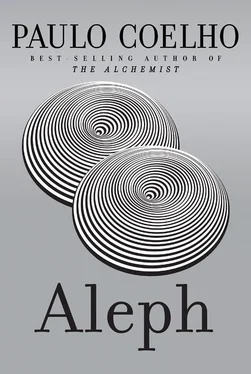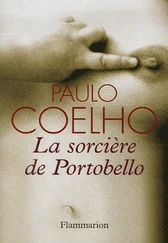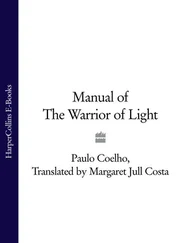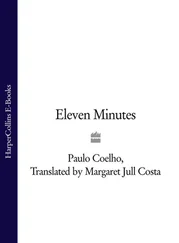YAO IS CALLING ME.
“The reporter is here.”
It’s still daylight, and the train is standing in a station. I get up, my head spinning, open the door a crack, and find my publisher waiting outside.
“How long have I been asleep?”
“All day, I think. It’s five o’clock in the afternoon.”
I tell him that I need a bit of time to take a shower and wake up properly so that I don’t say things I’ll regret later.
“Don’t worry,” Yao says. “The train will be here for the next hour.”
It’s lucky that we’re stationary: having a shower when the train is in motion is a difficult and dangerous task. I could easily slip and hurt myself and end the journey in the most ridiculous way possible—on crutches. Whenever I get into the shower, I feel rather as if I were surfing. Today, though, it’s easy.
Fifteen minutes later, I emerge, have a coffee with the others, and am introduced to the reporter. I ask him how long he needs for the interview.
“We can arrange a time. I thought I could travel with you until the next station and—”
“Ten minutes will do. Then you can get off right here. I don’t want to put you to any unnecessary trouble.”
“But you’re not—”
“No, really, I don’t want to put you to any trouble,” I say again. I should never have agreed to do this interview; I obviously wasn’t thinking straight when I said yes. My objective on this journey is quite different.
The reporter looks at my publisher, who turns away and stares fixedly out the window. Yao asks if the table is a good place for them to film.
“I’d prefer the space between the carriages, next to the train doors,” says the cameraman.
Hilal glances at me. That’s where the Aleph is.
Doesn’t she get tired of sitting at the same table all the time? Once she had sent me off into that place beyond time and space, did she, I wonder, stay in the compartment, watching me sleep? Well, we’ll have time enough to talk later.
“Fine,” I say. “Set up your camera. But, just out of curiosity, why choose such a small, noisy space when we could stay here?”
The reporter and the cameraman, however, are already heading for the end of the carriage, so we follow them.
“Why this tiny space?” I ask again, while they’re setting up the equipment.
“To give the viewer a sense of reality. This is where everything happens. People leave their compartments, and, because the corridor is so narrow, they come here to talk instead. Smokers meet up here. For someone else it might provide somewhere to hold a secret rendezvous. All the carriages have these vestibules.”
At the moment, the space is occupied by me, the cameraman, the publisher, Yao, Hilal, and a cook who has come to watch.
“Could we have a little privacy?” I ask.
A television interview is the least private thing in the world, but the publisher and the cook leave. Hilal and Yao stay where they are.
“Could you move a little to the left?” the cameraman asks.
No, I can’t. That’s where the Aleph is, created by the many people who have stood there in the past. Even though Hilal is keeping a safe distance, and even knowing that we would plunge back into that one point only if we were standing close together, I feel that it’s best not to take any risks.
The camera is running.
“Before we begin, you mentioned that interviews and publicity were not the main purpose of this journey. Could you explain why you decided to travel on the Trans-Siberian Railway?”
“Because I wanted to. It was a dream of mine as an adolescent. That’s all.”
“As I understand it, a train like this isn’t exactly the most comfortable mode of transport.”
I go into automatic pilot and start answering his questions without really thinking. The questions keep coming, about the experience itself, my expectations, my meetings with my readers. I reply patiently, respectfully, but all the time I’m longing for it to be over. I reckon that the stipulated ten minutes must have elapsed by now, but he keeps asking questions. I make a discreet gesture with my hand, indicating that he should wind up the interview. He looks slightly put out but continues talking nonetheless.
“Are you traveling alone?”
A warning light starts flashing. It would seem that the rumor has already started to spread. I realize that this is the only reason for this unexpected interview.
“No, of course not. You saw how many people there were around the table in there.”
“But apparently the first violinist from the conservatory in Ekaterinburg—”
Like any good reporter, he has left the most difficult question for last. However, this is far from being the first interview I’ve ever done, and I interrupt him, saying, “Yes, she happened to be traveling on the same train, and when I found out, I invited her to join us whenever she liked. I love music. She’s a very talented young woman, and now and then we have the pleasure of hearing her play. Would you like to interview her? I’m sure she’d be happy to answer your questions.”
“Yes, if there’s time.”
He isn’t here to talk about music, but he decides not to press the point and changes the subject.
“What does God mean to you?”
“Anyone who knows God cannot describe Him. Anyone who can describe God does not know Him.”
Wow!
I’m surprised by my own words. I’ve been asked this question dozens of times, and my automatic-pilot response is always: “When God spoke to Moses, he said: ‘I am,’ so God is, therefore, not the subject but the verb, the action.”
Yao comes over to me.
“Fine, we’ll end the interview there. Thanks very much for your time.”
I GO BACK INTO MY COMPARTMENT and start feverishly noting everything I’ve just been talking about with the others. We will soon be arriving in Novosibirsk. I mustn’t forget anything, not a single detail. It doesn’t matter who asked what. If I can record my responses, they will provide excellent material for reflection.
WHEN THE INTERVIEW IS OVER, I ask Hilal to go and fetch her violin, on the assumption that the reporter will stay around for a while longer. That way, the cameraman could film her, and her work will reach a wider public. The reporter, however, says that he has to leave at once and send his interview off to the editorial office.
Meanwhile, Hilal returns with her violin, which she had left in the empty compartment next to mine.
My editor reacts badly.
“If you’re going to stay in that compartment, you’ll have to share the cost of the hire of the carriage. You’re taking up what little space we have.”
Then she sees the look in my eyes and does not pursue the topic.
“Since you’re ready, why don’t you play something for us?” Yao says to Hilal.
I ask for the loudspeakers in the carriage to be turned off and suggest that Hilal play something brief, very brief. She does as asked.
The atmosphere grows suddenly limpid. This must be obvious to everyone, because the constant tiredness that has been afflicting us all simply vanishes. I’m filled by a deep sense of peace, deeper even than the peace I experienced shortly before in my compartment.
Why have I been complaining all these months about not being in touch with the Divine Energy? What nonsense! We are always in touch with it; it’s only routine that prevents us from feeling it.
“I need to speak, but I don’t know exactly what about, so just ask me whatever you like,” I say.
It won’t be me speaking, but there’s no point trying to explain that.
“Have you met me somewhere in the past?” Hilal asks.
Would she really like me to answer that right here, in front of everyone?
Читать дальше
